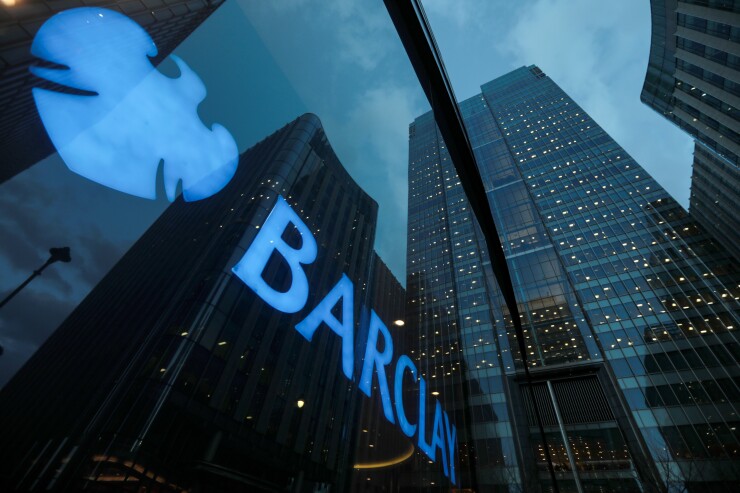Barclays is leveraging its global network of offices and its business expertise to sponsor fintechs through its Accelerator programs in London, New York and Tel Aviv.
The programs, which involve a partnership with Boulder, Colo.-based venture capitalist Techstars, are hosted at Barclays’ Rise fintech co-working spaces. Barclays operates five Rise hubs in Vilnius, Cape Town, Mumbai, London, Tel Aviv and New York.
When considering fintech partnerships, Barclays examines the various challenges across its operations. “We then source fintechs for our Accelerator programs, which we think will help us solve these problems and make everyday activities better,” said Mariquit Corcoran, director of partnerships and programs within Barclays Group Innovation.

Barclays gets 500 to 1,000 applications per cohort, the term it uses for each year’s Accelerator program in its three locations.
“We accept the top 10 in each location,” Corcoran said. “Companies can apply to whichever Accelerator works best for them, irrespective of their geographical location. Once we chose our top 10 companies for each Accelerator, they join us for 13 intensive weeks of mentoring with Barclays and Techstars, while we fine-tune their business model.”
Currently, Barclays is embarking on new Accelerator cohorts in New York, Tel Aviv and London. Next year it plans to start an Accelerator program in Mumbai.
The New York program began in September with 10 fintechs including Harvest, a personal finance platform that helps consumers negotiate bank fees; ResonanceX, a digital marketplace for structured investments trading; and SendFriend, a platform that provides blockchain-based remittances.
Recent graduates of Barclays’ Accelerator programs include B2B marketplace Crowdz; credit card loyalty offers program Kard; Simudyne, which provides virtual risk simulations; and paperless receipts/digital rewards specialist
Following a proof of concept trial conducted by Flux and Barclays, Flux is running a full commercial pilot in the U.K. involving integration of its digital receipts technology with Barclays’ mobile banking app.
Corcoran says Barclays takes a small equity stake in each fintech participant at the start of the Accelerator cycle, as does its partner Techstars.
“We work with Techstars for almost all our accelerators,” she said. “Where appropriate, Barclays may also make an additional investment at the end of the Accelerator program in any fintech where there is a strong strategic fit with Barclays’ focus.”
Barclays also invests in, and partners with, fintechs that don’t participate in the Accelerators.
“Before we fully engage with a company, we make sure the right controls are in place,” Corcoran said. “Also, before we integrate their technology into our offering. we conduct testing to make sure the we feel comfortable with it. Then we incorporate their technology into our risk and control framework.”
In August 2018, Barclays took a minority stake in online invoice financing platform MarketInvoice, and said it would offer the U.K. firm’s service to its SME customer base nationwide during 2019. MarketInvoice didn’t participate in an Accelerator program.
Barclays is the first bank to form a strategic partnership with MarketInvoice, which has funded invoices and business loans worth over £2.7 billion to U.K. companies since 2011. Also, Barclays plans to fund invoices via the MarketInvoice platform in the future.
Separately, Barclays said in August 2018 that it is partnering with U.S.-based B2B marketplace platform Crowdz, which participated in the 2018 London Accelerator. Crowdz provides an Ethereum blockchain-based marketplace that connects businesses digitally, moving the entire procurement process online, Barclays says in a news release.
Following the Accelerator program, Barclaycard is providing funding and support, including integration with its payments gateway, for a proof-of-concept to turn the Crowdz platform into a fully functioning ecosystem.
“We participated in the London Spring 2017 Accelerator in order to work with Barclays,” said Justin Lyon, Simudyne’s CEO. “Our goal was to shorten our sales cycle and to ensure we had product-market fit. There was a rigorous application and selection process. It wasn’t easy to get in, but was very well worth the benefit.”
The Accelerator program was transformational for Simudyne, according to Lyon.
“We’ve raised significant capital,” he said. “I’ve never worked so hard in my life. On the Accelerator, nobody would let you say something without challenging it. I really appreciated Barclays' being so open.”
Normally getting that kind of feedback from a bank is incredibly difficult, Lyon said.
“In the three months we were in the program, we got over 100 meetings,” he said. “You have to be prepared to have your ideas challenged. There were many times when our dreams were crushed. But you had to go back and say, ‘What’s next?’ That sort of feedback for a startup is precious.”
Corcoran says that Barclays has signed an enterprisewide license to use Simudyne’s risk simulation technology. “It provides AI-based modeling that lets banks simulate environments so they can predict risk,” she said.
Kard’s app provides credit cardholders with real-time information at the point of sale on cashback, miles and points offers and rewards from participating retailers and credit card issuers. Ben Mackinnon, Kard’s CEO, says the company tested its program with Barclays employees in the U.S., following its participation in Barclays’ Tel Aviv Accelerator in 2017.
“We’re now working on building out our partnership with Barclays to bring Kard to their U.S. cardholders,” he said. “Also, we’re talking to Barclaycard about a U.K. partnership. But we don’t have a road map for the U.K. yet.”
Kard’s business model involves splitting sales referral revenue it receives from participating retailers with its credit card issuer partners. “We have around 1,000 online retailers signed up and 10,000 participating in-store locations around the U.S.,” Mackinnon said. “Barclays has been our biggest supporter to date.”
Mackinnon said that Barclays provides assistance to companies participating in its Accelerators on how to navigate through the bureaucracy of partnering with a large international bank.





